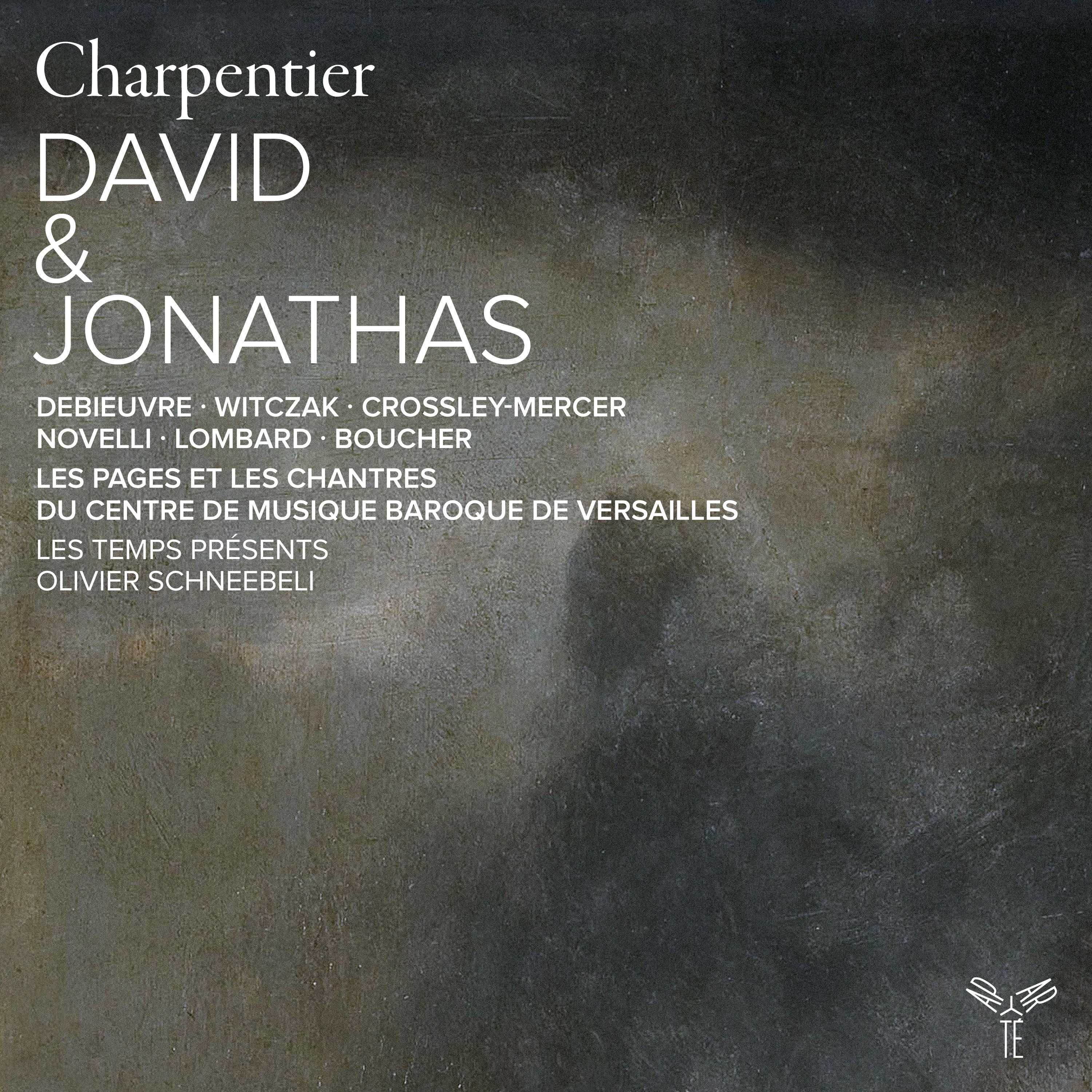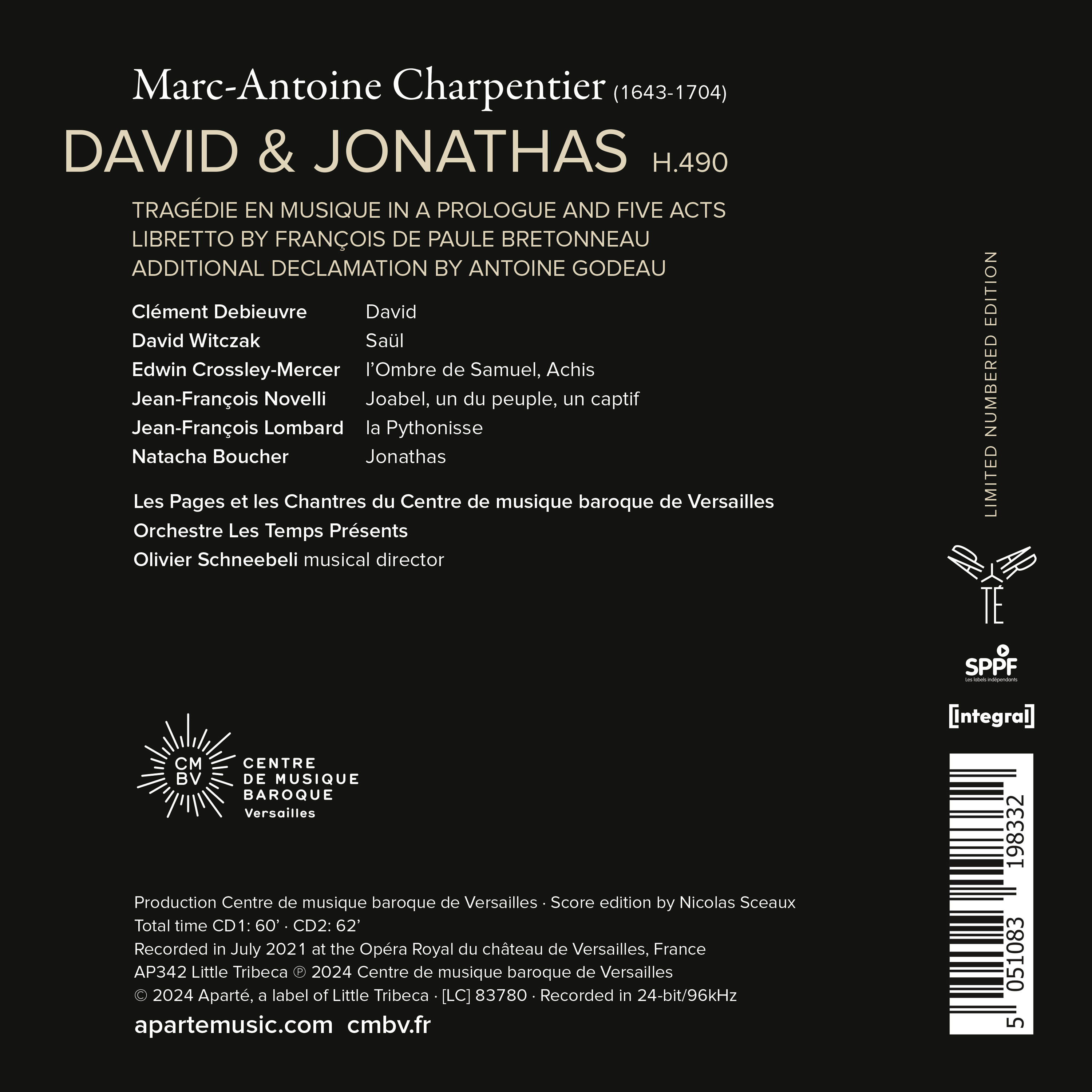Les Pages et les Chantres du CMBV, Orchestre Les Temps Présents, Olivier Schneebeli
AP342 - 2CD - 122' - Mar 1, 2024
In 1688, the Jesuit college Louis-le-Grand staged David et Jonathas, a lyrical tragedy written by Marc-Antoine Charpentier. Intended for the school's students and interspersed with the Latin tragedy Saul, it depicted the fratricidal friendship of David and Jonathas, at the mercy of an implacable fate and a cruel struggle for power. In this unique composition, Charpentier achieves both an expressive peak and an aesthetic counter-model to the Lullist archetype: no praise for the king in the prologue or machinery, few recitatives or divertissements. Instead, all the space is left to the drama and psychology of the characters, supported and magnified by counterpoint and harmonic refinement and poignant expressivity, of which the aria "A-t-on jamais souffert plus rude peine" is perhaps one of the high points.
Charpentier and his David et Jonathas are emblematic of the mission of the Centre de musique baroque de Versailles, which strives to bring to light composers and works that have fallen into oblivion. This, Olivier Schneebeli's latest recording, is notable for its exclusive use of children's and men's voices – the soloists, almost all graduates of the Maîtrise and now among the most brilliant singers of their generations. Natacha Boucher's Jonathas stands out, strikingly innocent and deeply sincere, as close as possible to Charpentier's original version.
In 1688, the Jesuit college Louis-le-Grand staged David et Jonathas, a lyrical tragedy written by Marc-Antoine Charpentier. Intended for the school's students and interspersed with the Latin tragedy Saul, it depicted the fratricidal friendship of David and Jonathas, at the mercy of an implacable fate and a cruel struggle for power. In this unique composition, Charpentier achieves both an expressive peak and an aesthetic counter-model to the Lullist archetype: no praise for the king in the prologue or machinery, few recitatives or divertissements. Instead, all the space is left to the drama and psychology of the characters, supported and magnified by counterpoint and harmonic refinement and poignant expressivity, of which the aria "A-t-on jamais souffert plus rude peine" is perhaps one of the high points.
Charpentier and his David et Jonathas are emblematic of the mission of the Centre de musique baroque de Versailles, which strives to bring to light composers and works that have fallen into oblivion. This, Olivier Schneebeli's latest recording, is notable for its exclusive use of children's and men's voices – the soloists, almost all graduates of the Maîtrise and now among the most brilliant singers of their generations. Natacha Boucher's Jonathas stands out, strikingly innocent and deeply sincere, as close as possible to Charpentier's original version.
CD1
PROLOGUE
1. Déclamation
2. Ouverture
3. Scène 1 : « Où suis-je ? qu’ai-je fait ? » (Saül)
4. Scène 2 : « Dois-je enfin éprouver le secours de vos charmes ? » (Saül, la Pythonisse)
5. Scène 3 : « Retirez-vous, affreux tonnerre » (la Pythonisse)
6. Scène 3 : « Ombre, c’est moi qui vous appelle » (la Pythonisse)
7. Scène 3 : « Quoi ! je parle, et l’enfer autrefois si fidèle » (la Pythonisse)
8. Scène 4 : « Quelle importune voix vient troubler mon repos ? » (l’Ombre de Samuel, Saül)
9. Scène 5 : « Est-ce assez ? ai-je enfin épuisé ta colère ? » (Saül, la Pythonisse) ; reprise de l’ouverture
ACTE I
10. Marche triomphante 0’43
11. Scène 1 : « Du plus grand des héros, publions les exploits » (troupes de guerriers, de pasteurs et de captifs)
12. Scène 1 : « Le ciel dans nos bois le fit naître » (troupes de guerriers, de pasteurs et de captifs)
13. Scène 1 : « Jeune et terrible dans la guerre » (troupes de guerriers, de pasteurs et de captifs)
14. Scène 2 : « Allez, le ciel jaloux attend de tous vos vœux un légitime hommage » (David, troupes)
15. Scène 3 : « Ciel ! quel triste combat en ces lieux me rappelle ? » (David)
16. Scène 4 : « Le ciel enfin favorable à mes vœux » (Achis, David, troupes)
17. Scène 4 : « Après les fureurs de l’orage » (captifs, chœur)
18. Menuet
ACTE II
19. Déclamation
20.Prélude
21. Scène 1 : « Quel inutile soin en ces lieux vous arrête ? » (Joabel, David)
22. Scène 2 : « Dépit jaloux, haine cruelle » (Joabel, chœurs)
23. Scène 2 : « David au comble de la gloire » (Joabel)
24. Scène 2 : « C’est trop ; à mes fureurs il faut que tout réponde » (Joabel)
25. Scène 3 : « À votre bras vainqueur rien ne peut résister » (David, Jonathas, troupes)
26. Scène 3 : « Goûtons, goûtons les charmes » (David, Jonathas, troupes)
ACTE III
1. Déclamation
2. Symphonie d’ouverture
3. Scène 1 : « Ah ! je dois assurer et ma vie et l’empire » (Saül, Achis)
4. Scène 2 : « Objet d’une implacable haine » (Saül)
5. Scène 3 : « David peut-il attendre un retour favorable ? » (Jonathas, David, Saül, troupes)
6. Scène 3 : « Ah ! plutôt dès ce jour venge-moi d’un perfide » (Jonathas, David, Saül, troupes)
7. Scène 4 : « Achevons ; mon bonheur passe mon espérance » (Joabel, chœur)
8. Gigue
ACTE IV
9. Déclamation
10. Prélude
11. Scène 1 : « Souverain juge des mortels » (David)
12. Scène 2 : « Vous me fuyez ! » (Jonathas, David)
13. Scène 3 : « A-t-on jamais souffert une plus rude peine ? » (Jonathas, chœur)
14. Scène 3 : « Courons, courons : cherchons dans les combats » (chœur)
15. Scène 4 : « Venez, Seigneur, venez : Saül va vous attendre » (Saül, Achis)
16. Scène 5 : « Enfin vous m’écoutez, Seigneur ? et la victoire » (Joabel)
17. Scène 5 : « Courons, courons : cherchons dans les combats » (Achis, chœurs)
18. Rigaudon
19. Bourrée
CD2
ACTE V
20.Déclamation
21. Bruit d’Armes
22. Scène 1 : « Courez ; Saül attend un secours nécessaire » (Jonathas)
23. Scène 2 : « Que vois-je ? Quoi ! je perds » (Saül, Jonathas, troupes)
24. Scène 2 : « Qu’entends-je ? il va périr ! quelle fureur m’anime ? » (Saül, Jonathas, troupes)
25. Scène 3 : « Victoire ! Victoire » (chœur)
26. Scène 4 : « Qu’on sauve Jonathas… courez, courez… soins superflus ! » (David, Jonathas)
27. Déclamation
28. Scène 4 : « Jamais amour plus fidèle et plus tendre » (chœur, David)
29. Scène 5 : « Vois, traître, et reconnais ta nouvelle victime » (Saül, David)
30. Scène 6 : « Joignez à vos exploits l’honneur du diadème » (Achis, David)
31. Scène 6 : « Du plus grand des héros, chantons la gloire » (Achis, chœur)



